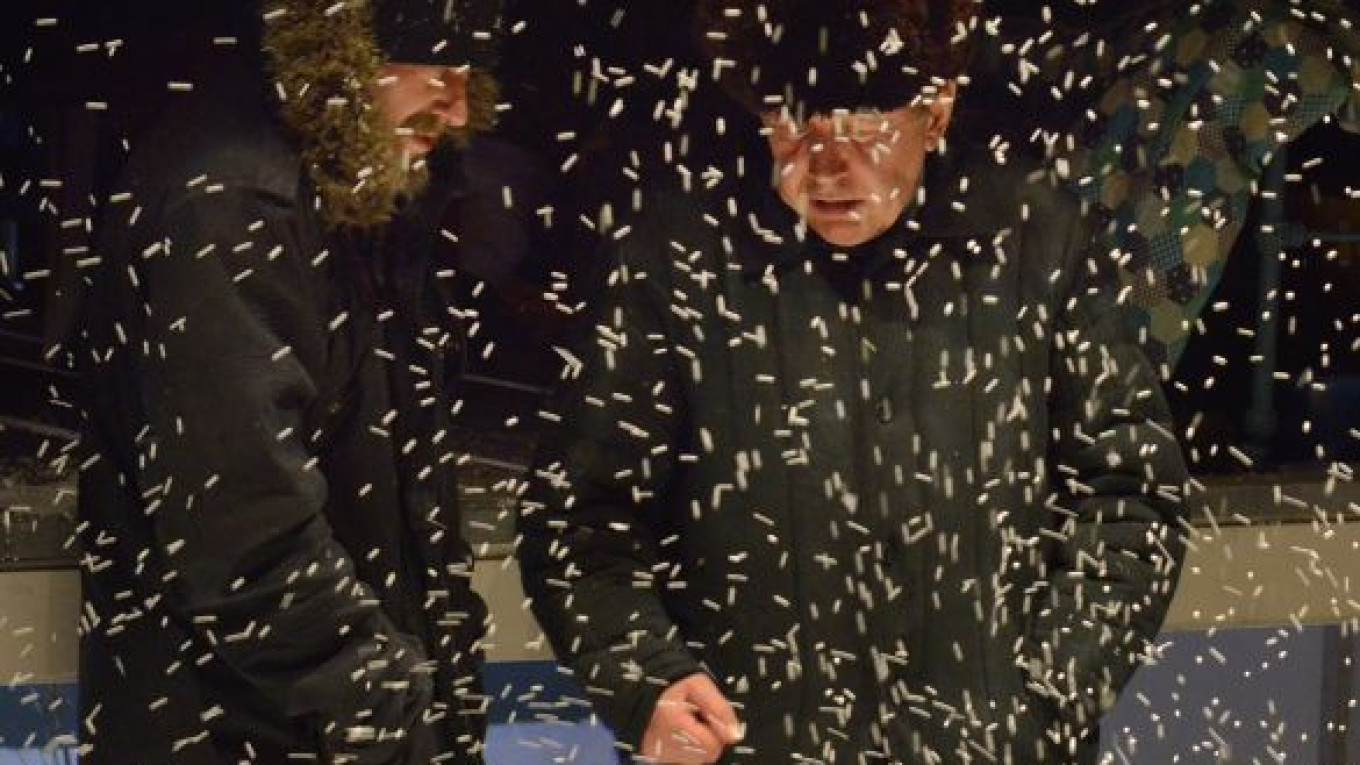Most of the elements going into Alexander Gordon's production of "Snow" at the Contemporary Play School point to a show that should work well.
Alexei Tregubov's set of a snowbound hut in the country is beautiful and highly theatrical. The company's acting is lively and usually engaging. Gordon's direction is clear and bold. The story — based on a novella called "Commentary on an Unreflexive Verb" by the director's father Garri Gordon — is clever and meaningful. And yet the admirable parts add up to a whole that seems less than what is promised.
"Snow" is always a visually attractive, at times even gorgeous and mesmerizing, show. Tregubov saw to that with an inventive approach to space that employs various perspectives simultaneously.
Standing as if on stilts or pylons at center stage is an open-faced view of a rustic, wooden hut. Its cramped space is filled with messy beds, rough-hewn chairs and a table, clothes, reading matter, vodka bottles and other sundry objects without which one could not survive long in the country.
Where the magic happens, though, is in the enclosed area beneath the main set decoration. Essentially hidden when the lights are up on the main set, Tregubov here offers a bucolic view of two log cabins as if seen from several kilometers away. They appear as if out of nowhere when the main stage lights are dimmed. Warm yellow lights burn in their tiny windows, a translucent blue sky shimmers above them and a cold, blue-white snow swirls around them, building up heavily on their small, angled roofs.
These doll houses, as it were, surrounded by a few bare-branched birch trees, affect us emotionally. They evoke a sense of isolation, cold and, perhaps, even fear. By contrast, the lights shining in the windows offer us a modicum of hope and optimism.
Beyond all this, Tregubov set up a series of three industrial fans that blow Styrofoam snow every which way on stage, creating some of the finest theatrical blizzards I have ever witnessed.
The story brings together the artist Pyotr (Alexei Gnilitsky), the scientist Serafim (Vladimir Shulga) and the country bumpkin Savka (Yury Chernov) during a snowstorm that prompts each to exhibit his best and worst behavior. More to the point, however, it is a time in which varying philosophies and lifestyles run up against each other like runaway trains.
Perhaps not surprisingly the two who fall out most quickly are those who are most alike, the urban intellectuals. They met somewhere that matters little to the tale and the poet invited the scientist to join him for a winter fishing trip. It was a friendly gesture that all would regret.
Within moments of their arrival the scientist takes a hard fall on an icy patch and is rendered immobile by the pain in his leg. There is lots of talk about a local man who may come to evacuate them, but the situation increasingly looks like a parody of Jean-Paul Sartre's "No Exit" — these men are stuck with each other and the elements that keep them on the verge of freezing.
Pyotr's patience is tried especially when Serafim convinces him to recite some of his poetry. The scientist is put off by its illogicalities and has no qualms about saying so. Serafim, who appears to be good for nothing but offering blunt opinions, wears his welcome to its thinnest when he nearly burns the hut to the ground trying to stoke the fireplace.
Despite the fire, a few forays in and out of the cabin, and two short visits from a neighbor woman (Olga Gusiletova), "Snow" primarily consists of talk. Most of it is small although some is highfalutin. The more the men feel trapped and the more they resort to vodka to alleviate their frustrations, the more they tend to philosophize, making the odd effort at defining political freedom, inner freedom and the Russian national idea.
"There is none," Pyotr flatly state in regards to the latter.
The commitment to conversation is surely what keeps this show from blossoming fully. What reads with interest and irony on a printed page is not enough to fill a stage with action. Garri Gordon's novella, although delivered faithfully by the cast and director, for me remained literature and never quite became theater.
Having said that, however, I must admit I would gladly see this show again to appreciate the achievement of the set design.
"Snow" (Sneg) plays Nov. 28, Dec. 9 and 19 at 7 p.m. at the Contemporary Play School, located at 29/14 Ulitsa Neglinnaya. Metro Tsvetnoi Bulvar. Tel. (495) 694-0756. . Running time: 2 hours, 20 minutes.
Related articles:
A Message from The Moscow Times:
Dear readers,
We are facing unprecedented challenges. Russia's Prosecutor General's Office has designated The Moscow Times as an "undesirable" organization, criminalizing our work and putting our staff at risk of prosecution. This follows our earlier unjust labeling as a "foreign agent."
These actions are direct attempts to silence independent journalism in Russia. The authorities claim our work "discredits the decisions of the Russian leadership." We see things differently: we strive to provide accurate, unbiased reporting on Russia.
We, the journalists of The Moscow Times, refuse to be silenced. But to continue our work, we need your help.
Your support, no matter how small, makes a world of difference. If you can, please support us monthly starting from just $2. It's quick to set up, and every contribution makes a significant impact.
By supporting The Moscow Times, you're defending open, independent journalism in the face of repression. Thank you for standing with us.
Remind me later.


